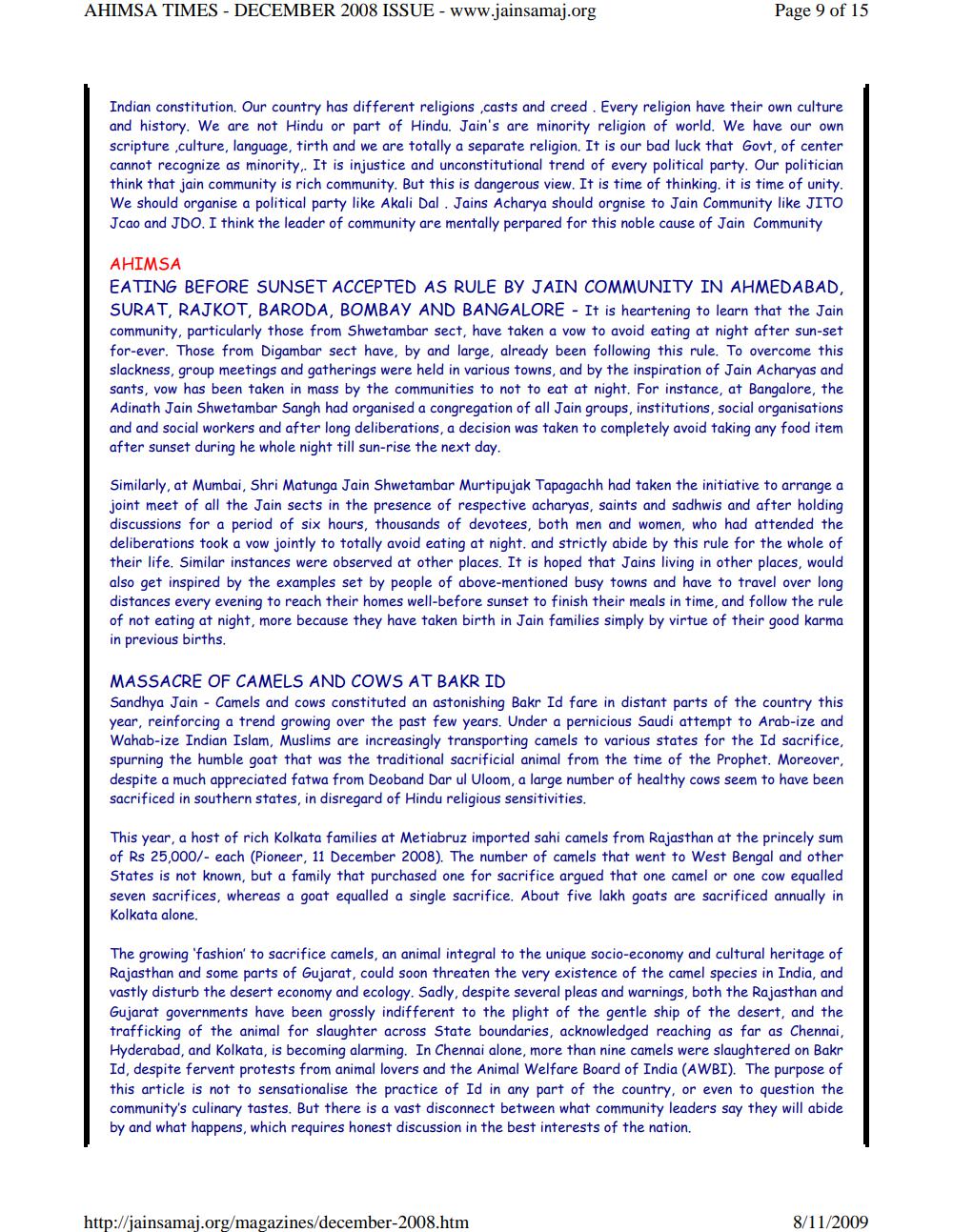Book Title: Ahimsa Times 2008 12 SrNo 102 Author(s): Ahimsa Times Publisher: Ahimsa Times View full book textPage 9
________________ AHIMSA TIMES - DECEMBER 2008 ISSUE - www.jainsamaj.org Page 9 of 15 Indian constitution. Our country has different religions,casts and creed. Every religion have their own culture and history. We are not Hindu or part of Hindu. Jain's are minority religion of world. We have our own scripture,culture, language, tirth and we are totally a separate religion. It is our bad luck that Govt, of center cannot recognize as minority,. It is injustice and unconstitutional trend of every political party. Our politician think that jain community is rich community. But this is dangerous view. It is time of thinking, it is time of unity. We should organise a political party like Akali Dal. Jains Acharya should orgnise to Jain Community like JITO Jcao and JDO. I think the leader of community are mentally perpared for this noble cause of Jain Community AHIMSA EATING BEFORE SUNSET ACCEPTED AS RULE BY JAIN COMMUNITY IN AHMEDABAD, SURAT, RAJKOT, BARODA, BOMBAY AND BANGALORE - It is heartening to learn that the Jain community, particularly those from Shwetambar sect, have taken a vow to avoid eating at night after sun-set for-ever. Those from Digambar sect have, by and large, already been following this rule. To overcome this slackness, group meetings and gatherings were held in various towns, and by the inspiration of Jain Acharyas and sants, vow has been taken in mass by the communities to not to eat at night. For instance, at Bangalore, the Adinath Jain Shwetambar Sangh had organised a congregation of all Jain groups, institutions, social organisations and and social workers and after long deliberations, a decision was taken to completely avoid taking any food item after sunset during he whole night till sun-rise the next day. Similarly, at Mumbai, Shri Matunga Jain Shwetambar Murtipujak Tapagachh had taken the initiative to arrange a joint meet of all the Jain sects in the presence of respective acharyas, saints and sadhwis and after holding discussions for a period of six hours, thousands of devotees, both men and women, who had attended the deliberations took a vow jointly to totally avoid eating at night. and strictly abide by this rule for the whole of their life. Similar instances were observed at other places. It is hoped that Jains living in other places, would also get inspired by the examples set by people of above-mentioned busy towns and have to travel over long distances every evening to reach their homes well-before sunset to finish their meals in time, and follow the rule of not eating at night, more because they have taken birth in Jain families simply by virtue of their good karma in previous births. MASSACRE OF CAMELS AND COWS AT BAKR ID Sandhya Jain Camels and cows constituted an astonishing Bakr Id fare in distant parts of the country this year, reinforcing a trend growing over the past few years. Under a pernicious Saudi attempt to Arab-ize and Wahab-ize Indian Islam, Muslims are increasingly transporting camels to various states for the Id sacrifice, spurning the humble goat that was the traditional sacrificial animal from the time of the Prophet. Moreover, despite a much appreciated fatwa from Deoband Dar ul Uloom, a large number of healthy cows seem to have been sacrificed in southern states, in disregard of Hindu religious sensitivities. This year, a host of rich Kolkata families at Metiabruz imported sahi camels from Rajasthan at the princely sum of Rs 25,000/- each (Pioneer, 11 December 2008). The number of camels that went to West Bengal and other States is not known, but a family that purchased one for sacrifice argued that one camel or one cow equalled seven sacrifices, whereas a goat equalled a single sacrifice. About five lakh goats are sacrificed annually in Kolkata alone. The growing 'fashion' to sacrifice camels, an animal integral to the unique socio-economy and cultural heritage of Rajasthan and some parts of Gujarat, could soon threaten the very existence of the camel species in India, and vastly disturb the desert economy and ecology. Sadly, despite several pleas and warnings, both the Rajasthan and Gujarat governments have been grossly indifferent to the plight of the gentle ship of the desert, and the trafficking of the animal for slaughter across State boundaries, acknowledged reaching as far as Chennai, Hyderabad, and Kolkata, is becoming alarming. In Chennai alone, more than nine camels were slaughtered on Bakr Id, despite fervent protests from animal lovers and the Animal Welfare Board of India (AWBI). The purpose of this article is not to sensationalise the practice of Id in any part of the country, or even to question the community's culinary tastes. But there is a vast disconnect between what community leaders say they will abide by and what happens, which requires honest discussion in the best interests of the nation. http://jainsamaj.org/magazines/december-2008.htm 8/11/2009Page Navigation
1 ... 7 8 9 10 11 12 13 14 15
